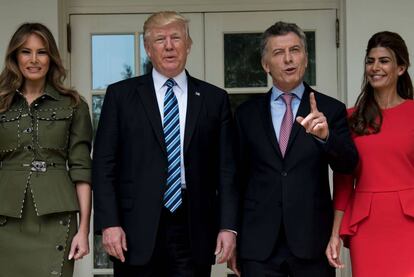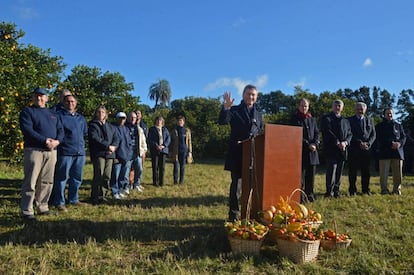Argentina’s Macri meets Trump to discuss closer partnership
At White House, US president suggests there could be a solution to the ban on lemon imports
A business past and a political present came together on Thursday when US President Donald Trump and Argentina’s Mauricio Macri met for talks in the White House. “He’s been my friend for many years. We’ve known each other for a long time, since before politics, and who would’ve thought that this could happen to the two of us,” said Trump, as Macri nodded his head in assent. Both men held business meetings in the 1980s that failed to produce a deal, but in the Oval Office on Thursday, the prevailing mood was one of goodwill.

Trump backed Macri’s economic reforms and called for a deeper partnership. This is what the Argentinean leader wanted to hear: the purpose of his visit was to clear up how the Republican’s victory will affect the thaw in relations that began with the end of kirchnerism in Argentina.
Before the US election, Macri had called Trump “a madman.” But the president of the South American nation has since adopted a more pragmatic approach. Argentina’s foreign minister, Susana Malcorra, has described the new US administration as both “a threat” and “an opportunity.” Both nations are divided by Trump’s anti-immigrant rhetoric and protectionist tendencies, yet both leaders share a common background as businessmen with conservative views.
“We’re just going to be great friends, better than ever before,” said Trump. “He is a great person, a great leader. He will do a fantastic job for Argentina.”
Macri is the second Latin American leader to meet with Trump after Peru’s Pedro Pablo Kuczynski
Yet for all the praise, Macri did not secure any public commitment of investment such as Barack Obama promised during his trip to Buenos Aires in March 2016. This kind of funding is vital to Macri’s pro-business agenda, given the weakness of the Argentinean economy. Before traveling to Washington, Macri met in Houston with energy investors whom he offered a “predictable and sustainable” investment climate.
Nor did Macri manage to get a pledge from Trump to to lift a ban on imports of lemons and biodiesel, although the US president seemed open to finding a solution. “I think we’re going to be very favorably disposed,” he said in response to a reporter’s question. Argentina is the world’s top producer of lemons, and Obama had recently authorized imports again after a 15-year ban.
In a joint statement, both leaders called on their Cabinets to “expeditiously chart a path forward to resolve pending bilateral agricultural issues, based on scientific principles and international standards.”

They also “pledged to strengthen our partnership to combat narcotics trafficking, money laundering, terrorist financing, corruption, and other illicit finance activities; cooperation on cyber policy, and expedited entry of pre-vetted, low-risk Argentine travelers through United States ports of entry.”
Venezuela mention
The crisis in Venezuela was also addressed during the working lunch, when Trump described the country as a mess. Macri said that Venezuela “is not a democracy” because it does not respect human rights, and said he will continue to press for elections and the release of political prisoners.
Macri is the second Latin American leader to meet with Trump after Peru’s Pedro Pablo Kuczynski. Following his meeting, which he described as “wonderful,” Macri said that “we found a very friendly environment. They were open to finding solutions.”
After joking about their golf games together decades ago, Macri said that his country “has become a part of the global scene once more,” a reference to a decade of administration by the Kirchners, who aligned Argentina with Latin America’s leftist, anti-American left.
English version by Susana Urra.
Tu suscripción se está usando en otro dispositivo
¿Quieres añadir otro usuario a tu suscripción?
Si continúas leyendo en este dispositivo, no se podrá leer en el otro.
FlechaTu suscripción se está usando en otro dispositivo y solo puedes acceder a EL PAÍS desde un dispositivo a la vez.
Si quieres compartir tu cuenta, cambia tu suscripción a la modalidad Premium, así podrás añadir otro usuario. Cada uno accederá con su propia cuenta de email, lo que os permitirá personalizar vuestra experiencia en EL PAÍS.
¿Tienes una suscripción de empresa? Accede aquí para contratar más cuentas.
En el caso de no saber quién está usando tu cuenta, te recomendamos cambiar tu contraseña aquí.
Si decides continuar compartiendo tu cuenta, este mensaje se mostrará en tu dispositivo y en el de la otra persona que está usando tu cuenta de forma indefinida, afectando a tu experiencia de lectura. Puedes consultar aquí los términos y condiciones de la suscripción digital.








































